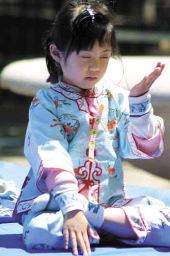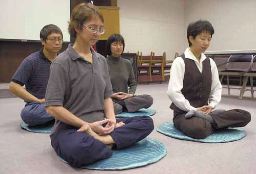The Lubbock Avalanche-Journal: Falun Gong -- Practice emphasizes improvement of mind, body
Religion Editor
March 27, 2004
LUBBOCK, Texas -- An astounding number of people around the world are persecuted and tortured solely because of the religion or life philosophy they espouse.
The Chinese government is among the worst offenders as it seeks to keep tight control over its citizens. In recent years, a rapidly growing movement called Falun Gong (also called Falun Dafa) has been a target of repression by the Chinese government, which banned it in July 1999.
|
Adherents of Falun Gong define it as a traditional self-cultivation practice to improve mind and body.
Rooted in ancient Chinese culture, Falun Gong is one of a variety of mind-body-spirit systems [in the Buddha School] (1). However, followers stress that it is not part of Buddhist or Taoist religions.
Falun Gong was introduced to the public in 1992 by Li Hongzhi, founder.
Spread by word of mouth, the once private practice of Falun Gong has grown by leaps and bounds, especially in China, where its success has alarmed the government and resulted in pressures on individuals to renounce the practice.
Those who have refused to renounce have been persecuted with ransom, forced divorce, social isolation and hard labor as well as various types of imprisonment and torture.
"The Falun Gong Report 2002" provides photos and descriptions of members of the group who have been subjected to various levels of torture, many resulting in death.
"In a 1997 survey, Falun Gong had 70 million, more than (the Communist) Party members," said John Sheen, a Lubbock practitioner of Falun Gong.
Sheen and his wife, Junping Chen, and Barbara Ni are members of the Lubbock Falun Gong exercise and meditation class, which was begun by Cynthia Liu in 2000. She has moved, but the meetings continue. The small core group of four or five welcomes visitors each week. They meet from 2 to 4 p.m. Saturdays in the community room at Mahon Library.
There is no requirement that they meet, but coming together for the exercise and meditation is helpful. When visitors come, more of the time is devoted to teaching the five exercises.
|
The purpose of the meditation is to empty the mind of all things, Sheen said.
'The American public is so supportive," Ni said. "I am very moved by the sense of human rights here in the United States."
She emphasized her gratitude to Mahon Library for allowing the group to meet there each week.
Falun Gong is not considered a religion, because there is no worship of anyone involved, Ni said.
Ann Hodges started attending the class around Thanksgiving.
"It's a very easy exercise to pick up and follow up with the basics in one afternoon," Hodges said. "I can take it with me, as little or as much as I want."
Ping said, "The exercise itself can be five, 10, 30 minutes or longer. You can do a set anytime. It improves the physical, adjusts the body to ideal condition, and gets the bad energy out, the good energy in."
The exercise may be done at work or at home.
Although the gentle, stretching movements of the exercise are beneficial to health, the greatest benefit comes from the meditation and development of the principles of Falun Gong, which are truthfulness, compassion and forbearance, Ni said.
Those interested in learning more about the philosophy upon which Falun Gong is based are referred to the organization's Web site at www.falundafa.org. Materials may be downloaded at no cost.
The practitioner of Falun Dafa is expected to study the teachings of its founder and perform the five gentle exercises. Benefits range from improved health and energy to mental clarity, stress relief and peace of mind.
Persecution in China has resulted in the spread of Falun Gong to about 60 countries, as practitioners leave in order to survive. [From Clearwisdom: Mr. Li Hongzhi began traveling and teaching Falun Gong all over the world beginning in 1996, three years before the persecution began. Most practitioners outside of China learned Falun Gong within the countries they reside. Those practitioners are from a wide range of ethnic and racial backgrounds. Few practitioners have been able to leave China since July 1999.] Their great concern is for those left behind.
According to Falun Gong reports, more than 1,600 have been tortured to death, more than 100,000 detained and more than 25,000 sent to labor camps. More than 1,000 have been forced into mental hospitals.
Falun Gong members have participated in demonstrations to raise world awareness about the human rights violations in China, including the arrest at the airport a little more than a year ago of Charles Lee, an American citizen who practices Falun Gong. He remains imprisoned in China.
Falun Gong (Dafa)
What: Self-improvement exercise and meditation.
Origin: Philosophy with roots in ancient Chinese [culture]
Principles: Truthfulness, compassion, forbearance.
Founder: Li Hongzhi.
Lubbock Falun Gong: Meets 2-4 p.m. Saturdays, Mahon Library.
Information about teachings: www.falundafa.org
"Not a single violent response has resulted from the peaceful demonstrations," Chen noted.
Source: http://www.lubbockonline.com/stories/032704/rel_0327040078.shtml
(1) We substituted "in the Buddha school" for "growing out of Buddhist philosophy and practice." In Zhuan Falun, Mr. Li's primary work, he stated, "Our Falun Dafa is one of the eighty-four thousand cultivation ways in the Buddha School, and it has nothing to do with the original Buddhism..."

